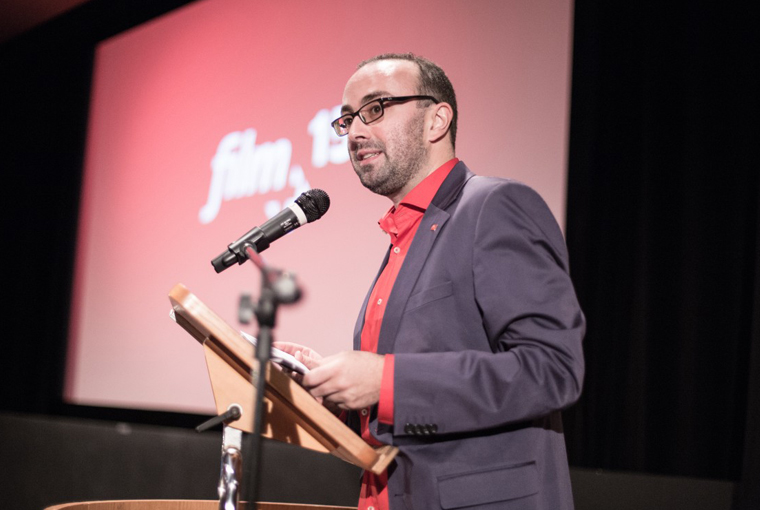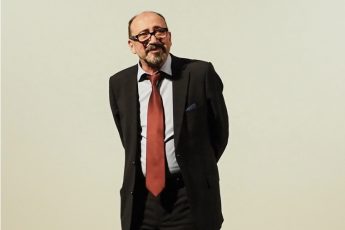
We met with Nikolaj Nikitin, the Berlinale’s delegate for Eastern Europe, to talk to him about the state of Russian cinema, the Russian film industry and the term “Eastern European cinema”…
Dear Mr. Nikitin, the Russian cinema was well-represented at this year’s Berlinale with films in several sections of the festival, among them “How I ended this Summer” in competition that was awarded two Silver Bears. What was the year 2010 like for Russian cinema?
For me, personally, the year 2010 regarding Russian cinema began with How I ended this summer by Aleksei Popogrebsky. Of course, after The Sun by Aleksandr Sokurov in 2005 it was a great pleasure to premier a Russian film in the competition at the Berlinale again. Popogrebsky is a director of the new generation of Russian filmmakers and I think that the movie is very important for Russia. It is a story that in many ways is very Russian, both in terms of the conflict and of the motives. The relationship between the older and the younger man in the film can be interpreted as a conflict between the old and the new Russia on a political, a socio-cultural or even a technological level.
On the other hand, the movie is universally rooted which makes it appealing to international festivals and audiences. A problem that Russian cinema has long had is that it was not capable of freeing itself from the great cinema and culture the previous generations had passed. Russian cinema in its references and idiosyncrasies was long hard to access for a foreign audience. How I ended this summer is more epic in that sense: Popogrebsky has a background in psychology and I do believe that that this psychological touch is visible.
Another movie that marks the year 2010 for Russian cinema is Silent Souls by Aleksei Fedorchenko that was presented at the Biennale in Venice. This film also got an award at the Biennale which shows that Russian cinema is internationally prominent and acknowledged.
You mentioned Aleksei Popogrebsky as a director of the new generation of Russian filmmakers. What does the new generation of Russian film-makers look like? Do you think that a new Russian cinema exists?
I do think that directors like Popogrebsky, Khlebnikov, Ilya Khrjanovsky, Aleksei German Jr., Anna Melikyan, Valeriya Gay Germanika or Igor Voloshin stand for a new generation of Russian cinema that reflect on contemporary Russia and have freed themselves from the filmic and literary tradition.
Russian film schools like the Gerasimov Institute of Cinematography in Moscow still have a good reputation in Eastern Europe, but it is interesting to see that in Russia many directors of the new Russian cinema do not have a classical film background. Apart from Popogrebsky, who studied psychology, there is also Kirill Serebrennikov (Playing Victim) or Vasilij Sigarev (Wolfy) who have a background in theater. Furthermore, there are many young directors in Russia who are sons of famous film-makers and were brought up breathing cinema, like Aleksei German Jr. (The Last Train), Ilya Khrjanovsky (4) or Yegor Konchalovsky (Antikiller) to name a few.
How is the new Russian cinema received in Russia?
Of course, there are many films that do not echo the vibe that they create at film festivals. Like in the United States or most European countries, the Russian box-offices is dominated by mainstream films. In the end, it is the mainstream cinema though that facilitates the existence of independent cinema. One should remember that in the United states, it was directors like Steven Spielberg that made Hollywood strong again in the 1970s, making independent cinema possible.
However, How I ended this summer for instance was very popular in the domestic box-office following up the success at the Berlinale.
Has Russia succeeded in establishing a film industry after the struggles in the early post-Soviet era?
Although Russia’s film industry is not yet comparable to the German or French film industry, movies like Night Watch or Day Watch showed that it is possible to make prosperous films in Russia, too. After the down-fall of the Soviet Union and the radical social, political and economic changes it brought about, Russian cinema fell into a crisis. The first blockbuster came in 1997 with Aleksey Balabanov’s Brother, a film that was very important for Russian cinema as it was the first post-modern film made in the new Russia. Since then, the trend has been very positive. Russia has established a film industry with a place for both mainstream and independent cinema, although the Russian film industry is clearly very dependent on the economic situation in the country. After the recent economic struggles, there are less films that are being produced, although that does not necessarily imply a decline in quality.
How centralized are the Russian film industry and film funding?
There are only a few studios dominating the film industry, with Mosfilm in Moscow, Lenfilm in Saint Petersburg and new studios like Russian World Studios operating. Private funders and TV are also investing more and more into film.
Unfortunately, there is no regional funding system like in Germany. The funding system is centralized and seated in Moscow with the Russian Ministry of Culture supporting films from all margins and a new film fund supporting big-budget movies.
Does this lead to a politicization of film?
Undoubtedly directors who confront the system in Russia face problems with distributing their film or making new movies. In 2009 we showed Russia 88 that was well-received at the Berlinale but exposed the director to great trouble in Russia.
I would say that one can trace a a subtle censorship in Russia where movies that are undesirable for the authorities are not funded as opposed to films about Ivan the Terrible or Peter the Great. Fortunately, there are still directors who speak openly about the problems of Russian society.
In December of the last year, one of the few Russian films that had a box-office success in Russia was “Klub Schastya” by Igor Kalenov, a film about the upper-class of Russia with fast cars, parties and women ornamenting the trailer. Directors like Aleksei Popogrebsky or Boris Khlebnikov on the other hand focus on the troubles of Russia’s lower class. Do the great differences in Russian society between the rich and the poor reflect in Russian cinema, too?
Russia has always been a country of great differences, and this also translates into Russian film. The most super-rich of the world live in Russia, and yet Russia is facing great social and economic problems with people living in extreme poverty.
Auteur directors do tend to focus on the lower class of Russia. Many Russian independent directors film on the countryside which is partially due to the limited financial capabilities and the high production costs in Moscow, but of course also a motivation that is topic driven.
Mainstream films speak about the upper class as opposed to the struggles of the poor, but I don’t think that that is a Russian phenomenon. Not only in Russia mainstream cinema has a different agenda than independent cinema.
Do you think one can speak of Eastern European cinema as an entity?
When one compares Baltic with Balkan cinema or Hungarian with Georgian film there are surely differences visible. However, I believe that there is something that strongly connects all the countries from Eastern Europe which is their history. Their mutual past until 1989 led to a common cinematic language that lasted until long after the down-fall of the iron curtain and is still visible.
The Romanian New Wave in a way is very diverse, but at the same time it deals mainly with the time since Ceauşescu. I hope that Russian cinema will succeed in dealing with Russia’s past and create such a movement as there is in Romania, too. Russia is rich of great talents, both in terms of directors and actors, and hopefully the industry will generate the necessary circumstances to create a distinct but accessible cinematic language.
How closely do the Eastern European countries work together in terms of film?
Especially in smaller countries like Serbia that have little funding from the state, the industry is dependent on co-productions both with established film countries like France or Germany, and neighboring countries.
I do think that Eastern European co-productions are the future of Eastern European cinema although of course it is important that the national identity of the respective movie is preserved.
There is a great potential lying in the discourse with the past and the changes that 1989 brought upon, and I am confident that Eastern European cinema will evolve more and more.
Thank you for the interview.




Leave a Comment